Ferrets at home: pros and cons, education and care

More recently, people only kept cats, dogs, parrots and fish in their homes. Today, the situation has changed - the list of pets has significantly increased. Many nowadays prefer to keep an animal from the weasel family - a ferret - in an apartment. These are adorable animals that immediately attract and cause affection. You want to buy a ferret or give it to one of your close friends. However, there is no need to rush here - it is necessary to take into account the many features of the content of this animal.
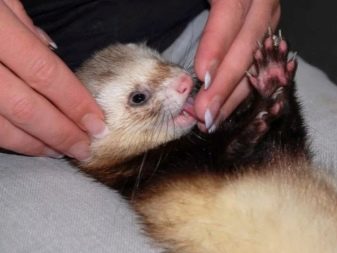



Advantages and disadvantages
Ferrets look very cute. I want to stroke them, hold them in my hands. Very often people, having fallen in love with these animals at first sight, are in a hurry to get them. However, you should not do this thoughtlessly, because in this case, a person may face many not very pleasant surprises. Before adopting a ferret, you need to weigh the pros and cons that you will have to deal with when keeping it. First, let's take a closer look at what the positive aspects of these charming animals are.
- The main advantage of ferrets is their small size. Thanks to this, such an animal can be kept without any problems even in a small apartment.
- It should be noted that the ferret (or ferret) is a very clean animal. In addition, it can be quickly and easily tray trained.
- Ferrets usually get along well with other animals in the same area. And we are talking not only about ferrets, but also about cats or dogs. The ferret itself is non-conflicting, so, as a rule, there are no problems in communicating with animal neighbors.
- The ferret can be transported without problems, if necessary, because it has a compact size.
- Ferrets are nocturnal, but can easily adapt to the daily routine of their owners. For example, while you are at work, the animal will sleep sweetly, and when it comes home, it will play with you.
- Ferrets' hair usually does not cause allergic reactions (hypoallergenic). This is the main advantage of these animals in comparison with cats. In addition, the ferret is very attached to the owner.
- This pet has a kind and playful disposition. He rarely sits calmly and prefers to play more.
- With a ferret you don't have to go out for a walk every day, which makes it a more comfortable and "attractive" animal compared to a dog. Excessive physical activity is also not required for this pet.
- Ferrets get used to the harness surprisingly quickly - usually the second time around.



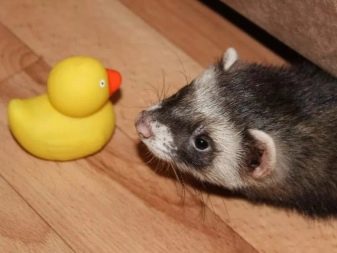
As you can see, the ferret has a lot of good qualities. That is why these adorable pets have gained immense popularity and become so in demand. But you shouldn't rush to buy such an animal until you familiarize yourself with all the complexities of its content.
- It should be borne in mind that ferrets have a specific smell. If a person is prone to allergic reactions or is simply too sensitive, then such animals will not suit him - they smell harsh.
- Ferrets are distinguished by their irrepressible temperament, high activity and rather stubborn character. It is almost useless to fight with such qualities of the animal - it is a wayward pet.
- Ferrets' favorite hobby is digging holes, so house flowers in pots will be in great danger if such an animal lives in the neighborhood.
- Ferrets are not adapted to food from the human table. From such food, the pet may even die.
- The male ferret will mark its territory during periods of sexual activity. Because of this, unpleasant odors in the home will become even more.
- Ferrets often get underfoot a lot, and also suffer from kleptomania and may even hide food.
- These pets are great connoisseurs of cleanliness and order, so they can gnaw and spoil all the things they find.
- Ferrets hate high temperatures and direct sunlight. Moreover, the animal can die if you leave it locked in a car without the air conditioner turned on. Owners often forget about this feature of pets, which has a bad ending.
- There are not many truly qualified veterinarians who understand ferret health issues. Sometimes looking for a good doctor for a sick animal takes a long time and is not always successful.
- Molting of these animals occurs twice in the off-season, as well as at the 20th week of pregnancy. This period takes from 7 to 20 days.
To keep a ferret at home, you need to consider not only its positive, but also its negative qualities.
The main reason why people refuse such an animal is an unpleasant smell coming from it. Of course, if you are not overly sensitive and do not have allergies, then this will not be a serious problem for you.
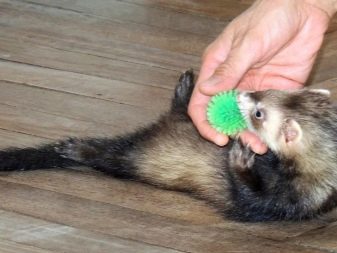
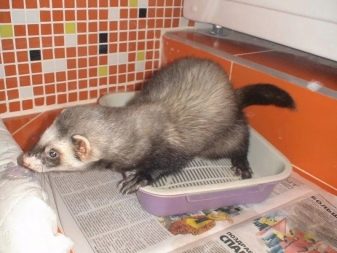


The nuances of education
It is advisable to train a ferret at an early age, because young animals learn effectively. Besides, they like it. Without proper upbringing, it will be very difficult for a ferret to adapt to life in an apartment, because they are unfamiliar to him. You should be a moderately strict master. The animal should be punished when necessary, but the ferret should not be forgotten and praised for good behavior.
Be prepared for the animal to literally test your character for strength. In their natural environment, these animals usually subjugate weak individuals, so the ferret will certainly try to build a hierarchy in relations with the owner. This behavior is especially common in animals during adolescence. In this case, you need to be as consistent and moderately strict as possible when raising the animal. If everything is done correctly, the ferret will understand who is in charge in the house and who should be obeyed.


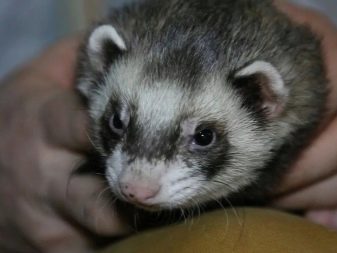

Many people who keep ferrets at home are interested in how to wean these animals from biting. Before figuring out how to raise a baby so that he does not bite household members, you should find out what is the reason for this pet behavior. In most cases, ferrets bite a person due to:
- stressful situations (for example, it can be a change of scenery, the appearance of another animal in the house);
- random actions during the game (these bites are not dangerous, the animal just did not calculate the effort a little);
- dominance (relevant if the ferret considers itself a dominant individual over a person);
- changes in behavior (may indicate the rutting period or an illness of the animal).
If the reason for this behavior of the ferret is stress, then here you need to provide the animal with maximum care. Treat your pet with respect, communicate affectionately, without unnecessary aggression. Over time, the ferret will calm down and behave well.

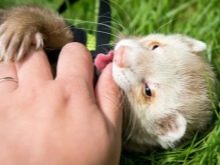
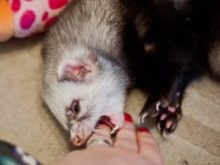
If the animal bit you while playing, then you should not worry, but you should not pay attention to such events at all. Gently grab the baby by the scruff of the neck and do not shake too much, saying "fu" or "no". In most cases, ferrets understand these signals and then try to be more careful when playing with a person.
If we are talking about the dominance of the animal, then here bites cannot be ignored. This situation needs to be dealt with. It is advisable to start hand training gradually, starting from a very early age.
Start holding the baby for a few minutes, and then slowly increase the time. While you are holding your ferret in your arms, treat him to a treat to evoke good associations. So you can make the baby understand that the superiority remains with the owner.
It is worth clicking the pet on the nose, but this should be done only as a last resort, because the ferret's nose is a vulnerable and very sensitive place. Because of such measures, you can cause a great resentment in the animal.
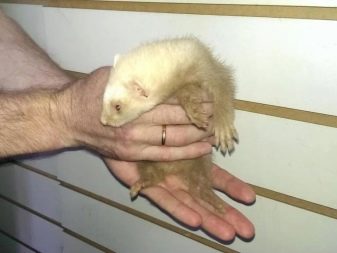
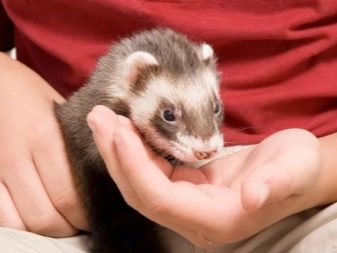
Try to convince your pet that an inevitable punishment will surely await him for a bite of his hands. Punishing a ferret is only worth it after committing a wrong act. If you punish your pet later, then he simply will not understand why you treated him so. Be sure to alternate punishments and rewards. If the baby sits in his arms peacefully, then he should be given a treat.
If we are talking about changes in the behavior of the ferret, then it is usually necessary to be patient. Such changes are usually temporary and soon come to naught. However, it should be borne in mind that such problems can arise due to diseases of the central nervous system. If you have such suspicions, then there is no time to waste. It is necessary to visit a veterinary clinic.
Know what penalties and rewards can be applied to your ferret. First, let's figure out how to praise your pet.
- Always praise your baby for doing the right thing, so that it is interesting for him to behave in the right way. So, if you see that the pet went into the tray, then it should be praised, stroked and given some kind of treat.
- If you took the animal in your arms and at the same time it behaves calmly, does not bite, then it should also be treated with a delicacy and stroked. Let your baby associate your hands with positive emotions.
- Praise the baby is necessary, but it is important not to overdo it. No need to pamper the animal while you are bringing up. Give the treats only as rewards.
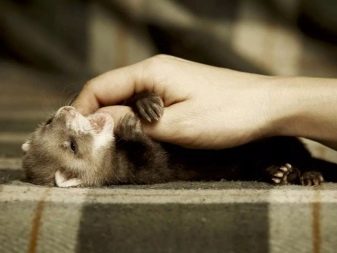

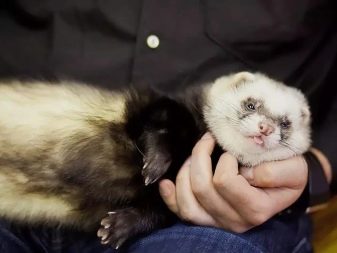

Now let's look at the intricacies of punishing a pet ferret.
- Punish the ferret right away - do not wait time, otherwise he will not understand anything.
- You should not be too cruel with the animal when you are punishing. Otherwise, the ferret will perceive you as a danger and will start hiding.
- Only regular punishment will make it possible to achieve a good effect in raising a pet.If today you punished him for some bad deed, and tomorrow and the day after tomorrow you did not punish your pet for the same wrong actions, then you should not expect the desired success in upbringing.
- The classic beast's warning is "fu". The same command is used when training dogs. As soon as you find your pet for a misdemeanor, you need to say "fu!" Several times. Unfortunately, at first it will not be possible to limit ourselves to this word alone - it will be necessary to resort to other punishments. But it won't take much time. Very soon, the animal will begin to understand such a warning and will not have to resort to additional measures.
- We must scold the ferret at the time of punishment. Of course, strict words by themselves may not bring the desired effect, but they will multiply the impression of the punishment as a whole.
- As a punishment, the baby can be removed to the cage. For many animals, it is the harshest, since ferrets themselves love freedom. As a punishment, you can keep the animal in the cage for about half an hour. But it must be borne in mind that such a method will be effective only if the animal usually moves freely around the apartment.
- You can click the ferret on the nose, but, as mentioned above, this should only be done in especially "acute" situations, for example, when the animal bites a person's hand. It is advisable to click on the animal's nose not with your fingers, but with a stick or other similar object. No extra effort is needed, otherwise the ferret may start to fear you. If after this punishment you see that the animal began to avoid you, then it is better to refuse such a measure and pick up something else.
- It is permissible to combine different punishments for the ferret. Thus, you are more likely to wean the animal from wrong actions. For example, if a baby bit your hand, you can click on the nose, shake it by the scruff, and then close it in the cage for about 20 minutes. This will show your ferret your extreme disapproval.
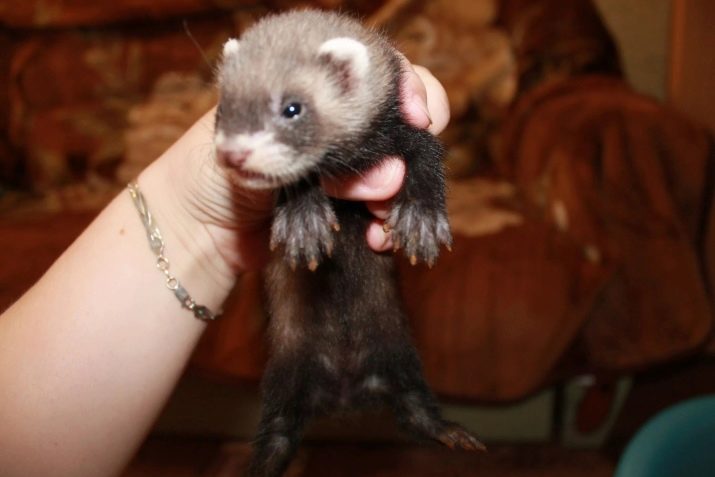
If you decide to have a ferret, then you need to consider that it needs to be given due attention. It is imperative to play with such an animal, while studying its habits and behavioral features. Raising a ferret is a feasible task for novice breeders. The main thing is to take into account how the animal behaves in different situations.
Many people are interested in whether it is possible to catch and tame a ferret on their own. Of course, you can catch him, but you will hardly be able to tame him. Ferrets have been domesticated for centuries. All this time, the excessive aggression of these animals gradually decreased, and trust in humans developed. If you want to keep an animal caught in its natural environment, then you need to prepare for some serious hassle. We'll have to make sure that the conditions of keeping the animal are as close as possible to those familiar to it - natural.
If you caught an adult animal, then it will most likely remain too shy. In the worst case, the adult ferret may remain aggressive. If the animal is caught small, then there may be different options, but the animal is unlikely to become as kind and affectionate as domestic individuals.
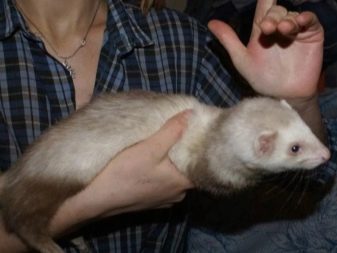

Choosing a home
The ferret needs to be provided with a good and comfortable home. It must necessarily meet a number of basic parameters. It is important to consider that these animals value space the most. Little houses and hammocks are a big joy for ferrets. The dimensions of the cage should be at least 80 x 80 cm.
When the animal is good and there is enough space in the cage and it feels good, it means that the "home" suits it perfectly. If you notice that the pet is crowded and cannot find a place for itself, then you need to build something better.
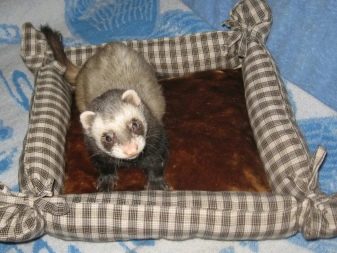
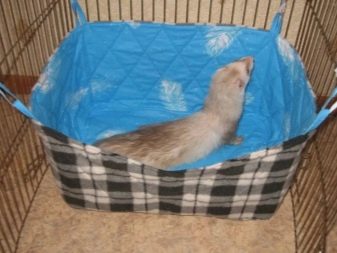


As a rule, in a cage with a ferret there is an impromptu mink (imitation). It is made so that the animal can feel safe, closed from the surrounding space. Mink can be made from different materials, such as rags.Elongated tubes, dark cardboard boxes are also suitable. In addition, in the "house" of the animal, it is necessary to equip a toilet, put a bowl of food, drinker and place toys.
It is recommended to use construction mesh as a material for the cage. About such an environment, the animal will not be able to break its teeth if it starts gnawing at it.
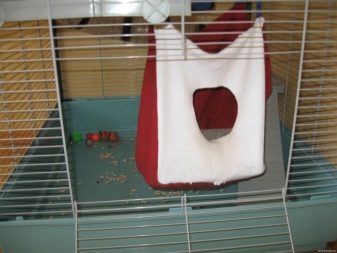

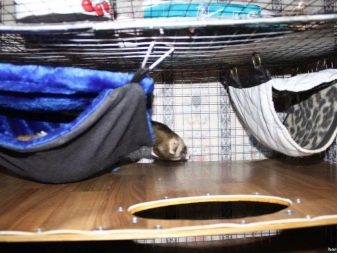
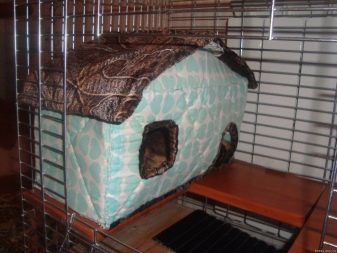
Ferret can also be kept on the balcony or loggia and even in a separate room. If you placed the bully on the balcony, then he will need to create comfort there. All holes and crevices, if any, must first be repaired, otherwise the animal will escape. Be sure to provide windows with strong and sturdy screens to prevent the pet from falling. It is possible to build a house for the animal from the boxes, so that there he can take a break from unnecessary attention. Do not forget to insulate the balcony, otherwise the baby can easily get sick. Remember to keep your balcony clean.
The best solution for a ferret is to keep it in free form, without using a cage. The pet will feel great if it is not constrained. But this solution will be convenient only for the baby himself, but not for his owners. In these circumstances, the baby will be active and energetic, will curl underfoot. No matter how tidy the ferret is, you will still have to clean up the "traces of the crime" after him from time to time, because not in all cases he will be able to reach the tray.
Keeping track of your pet under these circumstances will be more difficult, but much more interesting.
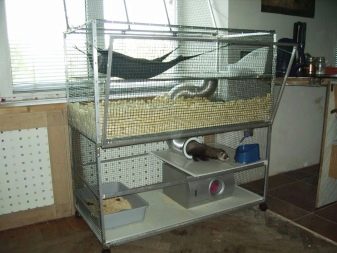
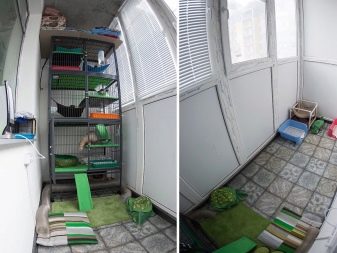
The room in which the ferret will live must be equipped according to all the rules. The animal should have its own private corner, where the boxes and boxes will be - so the ferret can play and hide. You will also need to put a tray and feeders there. The listed things will require proper care, otherwise an unpleasant specific aroma will "settle" in the room. The tray should be washed several times a day. The floors and feeder should also be clean. You cannot do without a drinking bowl or a separate bowl of water.
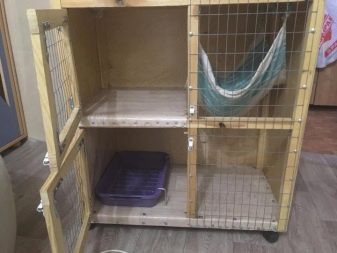
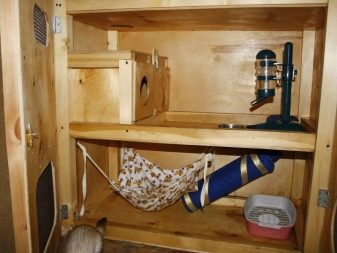
Nutrition rules
It is very important to pay proper attention to your ferret's nutritional guidelines if you want your ferret to be healthy and active. The diet should be based on natural foods. It is also permissible to feed the animal. special dry food. Create a food menu for your baby based on the vitamins your ferret needs. If you are an amateur in such matters, then it is better to use dry food.
At the pet store you can buy special food for ferrets or select premium food for cats - these animals have similar food preferences. It is advisable to select feed containing poultry, vegetables and fruits. Be sure to make sure that the animal always has an open path to clean and fresh water in unlimited quantities. If you use special dry food for feeding, you do not need to buy vitamins and supplements - everything you need is in the feed.




If you feed the animal with natural food, then the daily menu should consist of meat offal, vegetables and cereals, passed through a meat grinder. The following foods are prohibited for ferrets:
- nuts;
- citrus;
- carrots and apples;
- onion and garlic;
- sweet and starchy foods;
- sausages and smoked products;
- salty foods;
- a fish;
- dairy products;
- dog food;
- economy-class cat food;
- any food from the human table.
According to experts, the ferret's bowl should always contain fresh and safe food. In most cases, this animal eats 7-10 times in small portions during the day.




If you are feeding your ferret food of natural origin, it is sometimes advisable to add the necessary vitamins and minerals to it. This is especially true when it comes to feeding babies, pregnant or lactating individuals. It is advisable to discuss the optimal dosage of useful additives with a veterinarian, so as not to harm the pet, but to bring him only benefit.
Some owners feed ferrets with full-fledged carcasses of chickens, mice, cockroaches, mealworms. Thus, an impromptu "copy" of feeding is created, close to the natural habitat.

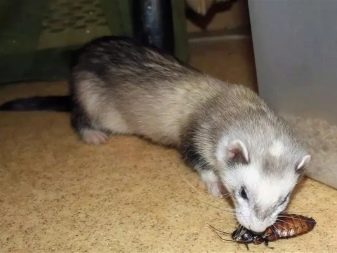
Hygiene
When keeping a ferret, it is required to provide her with a number of necessary hygienic procedures. Let's get acquainted with their list.
- Mainly it is cleaning the ears of the animal. This should be done no more than once a month. You will need to gently remove any brown wax-like deposits from your ears. As a rule, this is done using an ordinary cotton swab dipped in petroleum jelly beforehand.
It is better not to use other cleaning agents. You cannot go too deep into the shells to clean your ears.
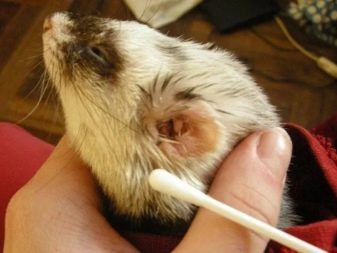
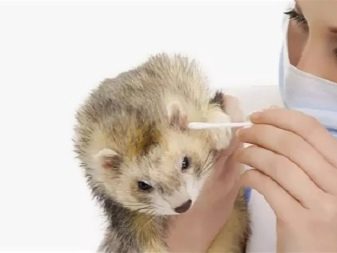
- If the ears of the ferret have black blotches, then this may indicate ear mite formation... They should be treated in a veterinary clinic.
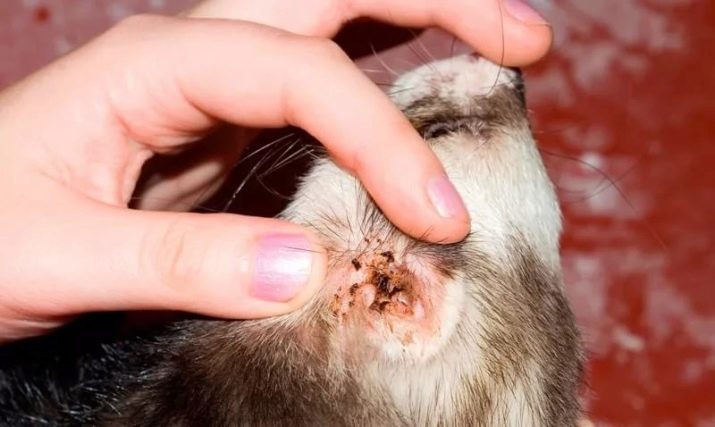
- Another necessary procedure is clipping the nails. It should be done every 3-4 weeks. It is advisable to cut the claws of a still sleepy pet, otherwise it may begin to strongly resist and break free.
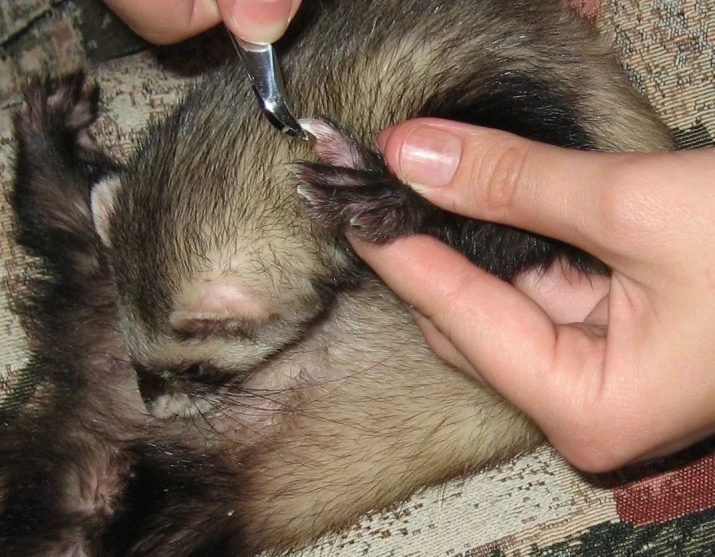
- You need to cut the claws with special scissors or trimmers, which are used to trim the nails of other pets. Cut off only the bent end of the claw, so as not to harm the vessel that passes inside. In another situation, the pet may be in pain, bleeding will begin. Be very careful. If, nevertheless, the vessel is damaged, then it is necessary to press the cotton wool soaked in iodine to the affected area.
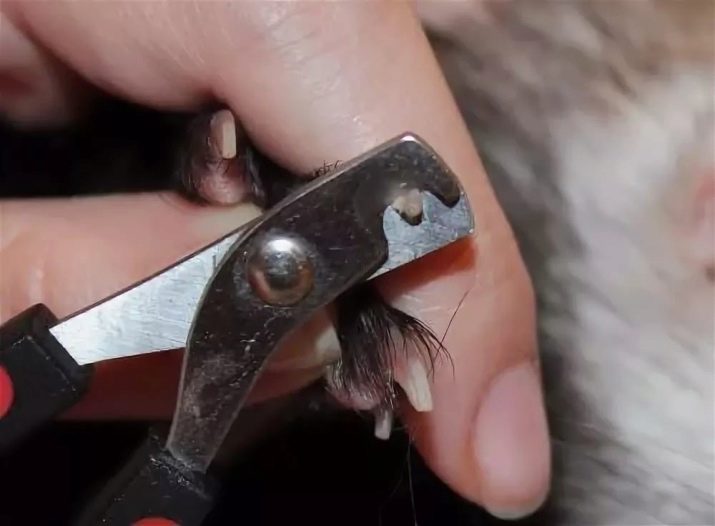
- Bathing - not the most necessary, but incredibly pleasant procedure for the ferret. These animals love to dive and frolic in the water. Bathing your baby in the bathroom will be the most convenient. The temperature of the liquid should be approximately 38-40 degrees (no more). It should be poured to a level of 2-3 animal growth. In the middle of the bath, equip an island (you can turn a basin or a bucket), on which the animal can catch on and on which it will rest.
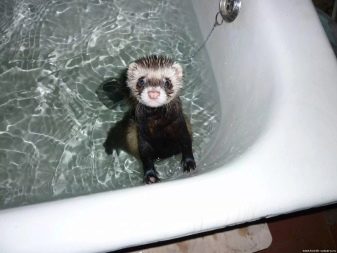
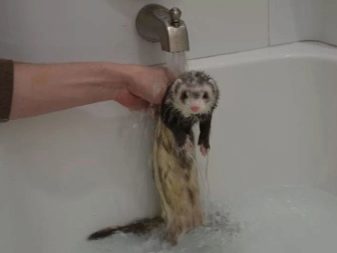
- You need to wash your baby with special products.... You can use baby soap or herbal shampoo for animals. Try to wash the animal so that water does not get into the eyes and ears.
The ferret will wipe by itself: you just need to wipe it lightly so that the liquid does not drip from the fur, and then place the animal in a box with clean towels.
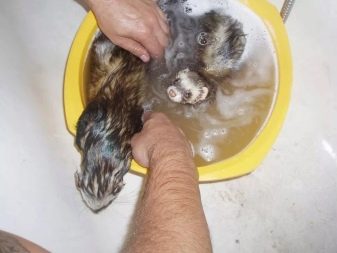
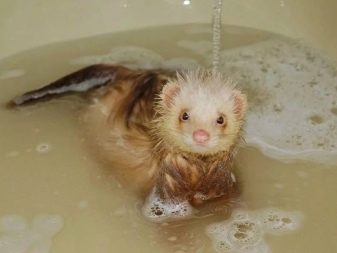
- You need to train your baby to use the litter box.... It can be not only his personal, but also the cat's trap. You can use a simple container with an additional mesh. In order for the animal to get used to the tray faster, it is advisable to arrange several of them around the room where the pet spends its time.
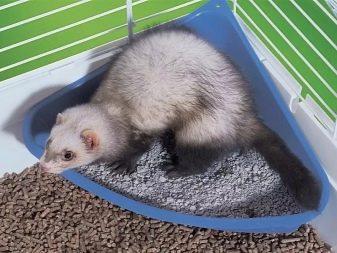
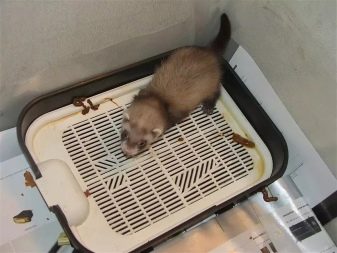
- In order for the ferret to understand where to go to the toilet, you should first stain his tray with feces a little. Never put the tray in a place where the animal is used to sleeping or eating. In such conditions, the animal will definitely not pee there.
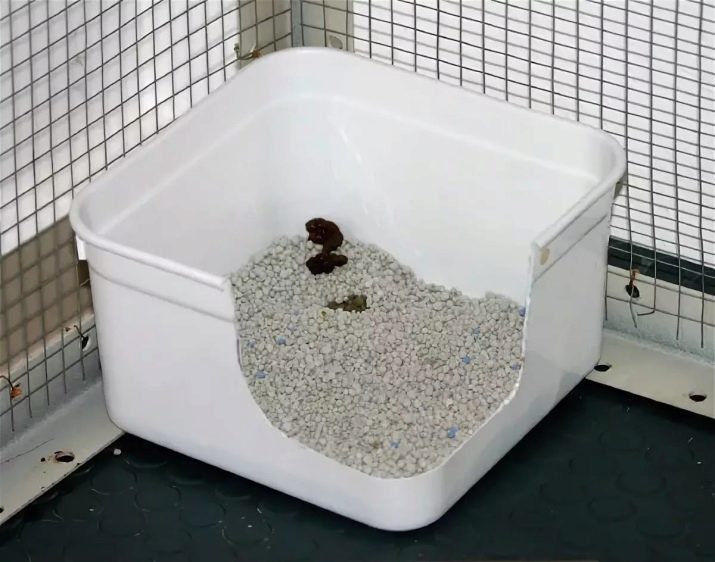
- The area around the toilet should also be very clean. If the animal went into the tray, be sure to praise him for it.
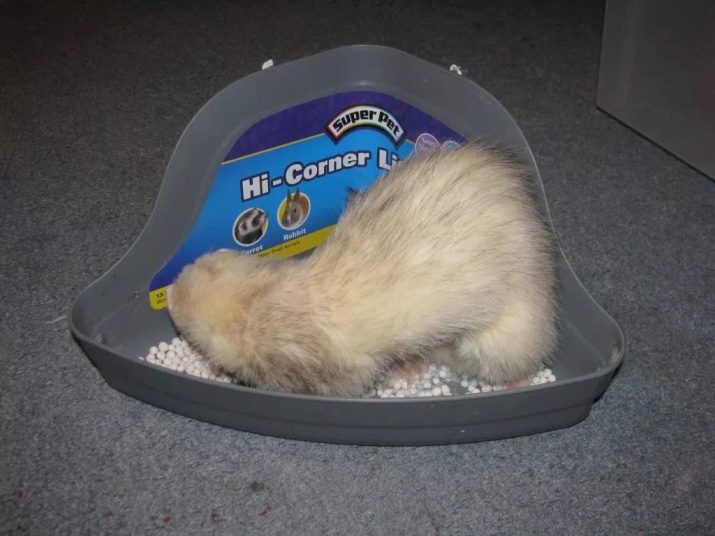
- During the molting period, the animal's coat must be properly looked after. You should regularly brush your ferret using a special soft brush, or gently pull out the fur.
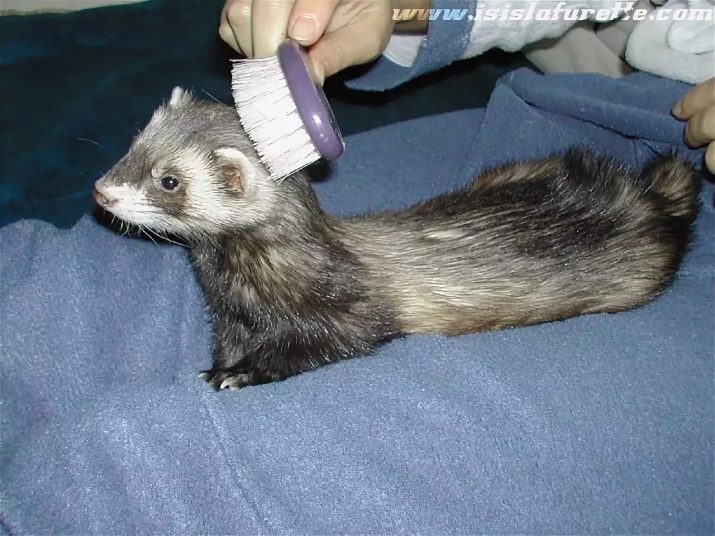
Owner reviews
Today many people keep ferrets at home. There are a lot of reviews on the network about the content of these pets, as well as about the general impression of them. Here are some of the current opinions of the owners of these adorable animals:
- the ferret itself is a very cute animal, but it should be started only if the person is ready for all the difficulties associated with caring for him;
- a very strong and unpleasant smell emanates from ferrets, the corner where the animal lives must be constantly washed - this is very inconvenient (castration or sterilization can save the situation, but some smell will still remain);
- Ferrets learn quickly and, with the right approach, are easy to educate;
- you need to be prepared for the fact that the animal will bite, grab hands and feet and will have to be re-educated;
- in matters of leaving the ferret is not too cheap;
- you need to play a lot with this animal, if you rarely appear at home and cannot pay due attention to it, then the animal will be bored;
- according to many breeders, the ferret is a real "bad child", so you should be prepared for his stubborn behavior.
There are still many different reviews about ferrets, but they are all similar in one thing - it is very important to educate this animal correctly, correctly punish and praise. Caring for such pets is expensive and difficult, so if you really want to get such a friend, then you should be prepared for this.
See below for tips on caring for your ferret.





